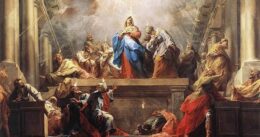There are many things to consider in making decisions about the music at Holy Mass. Some of them are liturgical, and some of them are very practical. We are still in Paschaltide, and that will continue to influence our choices. Pentecost is the second most important feast in the liturgical year, and so, it will dictate much of what we sing. Liturgically speaking, Pentecost calls for glorious music. Why, then, was the organ silent on Pentecost? For purely practical reasons. Both gentlemen who play the organ were away and so we had to do without! It is a strange coincidence that the very same thing happened last year! Apart from that little anomaly, Pentecost is very interesting, musically speaking.
We began with the vespers hymn, Veni Creator as the processional. The fact of the coming of the Holy Ghost is of such profound importance that we kneel at these words in the first stanza of the hymn:
Come, Holy Spirit, Creator, come, from Thy bright heavenly throne!
Similarly, we also genuflect during the following Alleluiatic Verse:
Come, O Holy Spirit, fill the hearts of Thy faithful: and kindle in them the fire of Thy love.
This is, of course, analogous to genuflecting during the Last Gospel when we hear:
And the Word was made flesh, and dwelt amongst us.
A couple of principles intersected as we sang the Veni Creator. The first principle is that, in general, the ceremony of the Mass must not be delayed by the singing of hymns, which are not actually a part of the Mass.
The second principle concerns the singing of a doxology. Hymns will often end with a doxology, a verse of praise, often, to the Trinity. Veni Creator ends with this doxology:
Now to the Father and the Son, Who rose from death, be glory given, with Thou, O Holy Comforter, henceforth by all in earth and heaven.
The interesting principle is that when singing such a hymn, the doxology should not be omitted. Thus, in order to adhere to both principles, we started the Processional earlier than usual, and it worked out rather nicely as we were finishing just as Father reached the foot of the altar.
Pentecost is the last Sunday of Paschaltide, and so it is the last Sunday on which the Vidi Aquam will be sung. It is also the last Sunday on which we will sing two Alleluias. Next Sunday, Trinity Sunday, we will resume singing the Gradual and Alleluia, and will do so until Septuagesima, at which time the Alleluia will be replaced by the Tract.
Pentecost is one of only five masses at which a Sequence is sung. These are the five:
- Pentecost Veni Sancte Spiritus
- Corpus Christi Lauda Sion
- Our Lady of Sorrows Stabat Mater
- Easter Victimae Paschali Laudes
- Requiem Dies Irae
As we had anticipated, the Stella Coeli Extirpavit was conspicuously missing at the Offertory. It is over two years that we have been singing it. Please God, the pestilence has abated. At our next opportunity, we will sing the Te Deum in gratitude. We instead sang the solemn version of the Marian Anthem for Paschaltide, Regina Coeli Laetare. So, we went from Stella Coeli (Star of Heaven) to Regina Coeli (Queen of Heaven).
At the Communion, we sang the Easter Sequence, Victimae Paschali Laudes, followed by Regina Coeli Jubila. The evening before, 22 men were received into the Holy Name Society as Novices, and in honor of the Holy Name, we sang, Jesu Dulcis Memoria.
This will be the last time we sing an Easter hymn until next year! It is time now to move to the long season consisting of the Sundays after Pentecost. Note that we had five Sundays after Epiphany and so there will be 24 Sundays after Pentecost this year.
As an aside, note that since Easter Sunday, in lieu of the Angelus, you should have been reciting the Regina Coeli. Paschaltide ends prior to Vespers on this coming Saturday, before the Feast of the Holy Trinity. Thus, the last time you will say the Regina Coeli is at Noon on Saturday.
We closed with Come Holy Ghost.
